A conversation with a Ukrainian journalist who documented the siege of Mariupol.
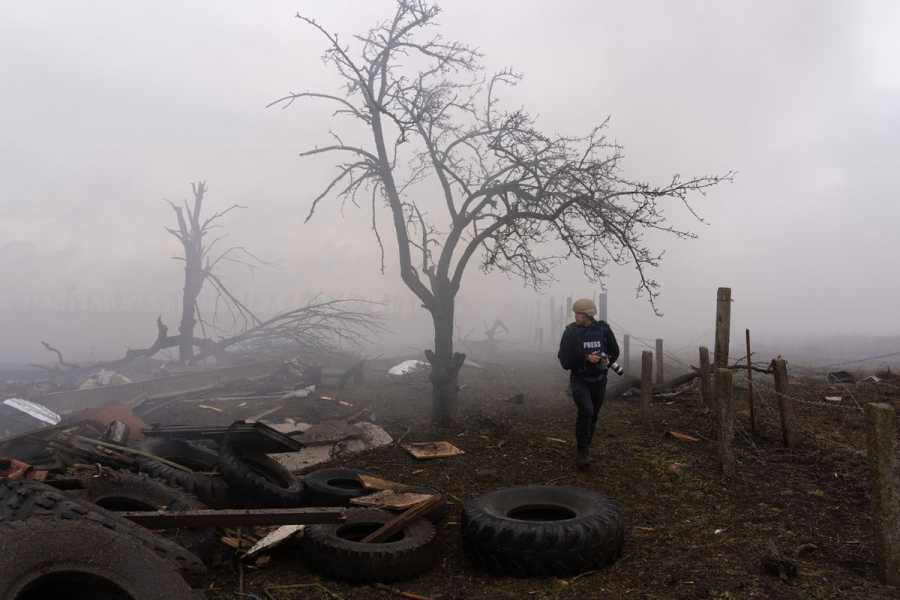
Photographer Evgeniy Maloletka picks his way through the aftermath of a Russian attack in Mariupol, Ukraine, February 24, 2022. AP Photo/Mstyslav Chernov Jen Kirby is a senior foreign and national security reporter at Vox, where she covers global instability.
The first weeks of Russia’s invasion of Ukraine unfolded in a rush: Russian tanks rolling through streets, tens of thousands fleeing, bombs over cities like Kyiv, Kharkiv, and Mariupol.
Mariupol, in particular, became a symbol of the brutality of Russia’s invasion — mostly through the work of a team of Ukrainian journalists from the Associated Press, who were the last international reporters left in the city.
Together, they documented the Russian siege of Mariupol, a city otherwise cut off. Only a sliver of what those reporters captured was published at the time, but what did became some of the defining images of the early days of the Ukraine war — children killed in air strikes and pregnant women, covered in blood, evacuating a bombarded maternity hospital.
Mstyslav Chernov, an AP videographer and member of the Pulitzer Prize-winning team, shot 30 hours of footage in Mariupol before he and his colleagues escaped the area through multiple Russian checkpoints.
The result is the AP and Frontline documentary, 20 Days in Mariupol, which recounts, day by day, the story of a city under relentless bombardment. The film shows Mariupol’s unraveling, the chaos and confusion that consumes people when they’re isolated and trapped. It also shows how Mariupol survived, how its residents — angry, terrified, heartbroken, exhausted — adapted to almost unfathomable horror. In one scene, Chernov asks a worker who is piling bodies in a mass grave, what he is feeling.
“I don’t know what I feel right now,” he says. “What are people supposed to feel in this situation?”
That question is the subtext throughout the film, and is accompanied by one asked explicitly over and over again: Why? The question is a perpetual one, in Ukraine and elsewhere. Nearly two years into war, Russia continues to bombard towns and villages, often far from the front lines. In Israel, Hamas murdered at least 1,200 people in a brazen attack and took scores hostage; since then, Israeli strikes have killed more than 13,000 Palestinians, according to Gaza health officials. In Sudan, the United Nations officials said last month that the power struggle there has killed more than 9,000 in six months.
The documentary does not leave you with a clear answer to why this happened in Mariupol or anywhere else. But it is an intimate, visceral look at how the victims of war confront that question and try to make sense of what is happening around them. Ahead of the documentary’s premiere on PBS stations on Tuesday, November 21 (check local listings; it’s also available to stream on YouTube, Frontline’s website, the PBS App, and on the PBS Documentaries Prime Video Channel), Vox spoke to Chernov in New York City about the documentary. We talked about how war coverage can and can’t influence public opinion and policy, almost two years after the siege of Mariupol, and almost a decade after he first started covering the conflict in 2014.
Our conversation, edited and condensed for clarity, is below.
What was most evocative for me about 20 Days in Mariupol was the sense of isolation. Mariupol was the front line, but the people there were cut off and had such a limited perspective — at one point, people didn’t know who to blame for the bombing, Russia or Ukraine. I wonder how you thought about that when filming.
People would see the press sign on the helmet and would go, “Tell me the news.” You were like a walking radio station in the city, everybody would come and say, “Hey, what’s the news? Is Kyiv still there? What’s with Kherson — I have relatives there.”
At that moment I thought: If this is a bigger story of the city, a big theme of that story would be misinformation, misinterpretation, and isolation.
For me, it’s not only a military siege, but an information siege — and its effect on a modern society. That was an eye-opening experience. In just, let’s say, three, four days, when the city was cut off from all the telephone lines, from the internet, this society just collapsed. I’ve never seen anything like that. People started to panic, to loot. They started to get confused whose fault it is, who’s bombing them. That’s a very sad but very important demonstration: What is happening to modern society when you suddenly cut off all the connections between people?
It’s destructive. More destructive than just leaving people without food or water. That confusion you see in the film — and the reason why I felt it was so important to show it — it’s because I feel this is an illustration for [what] the absence of connection and communication does to people.
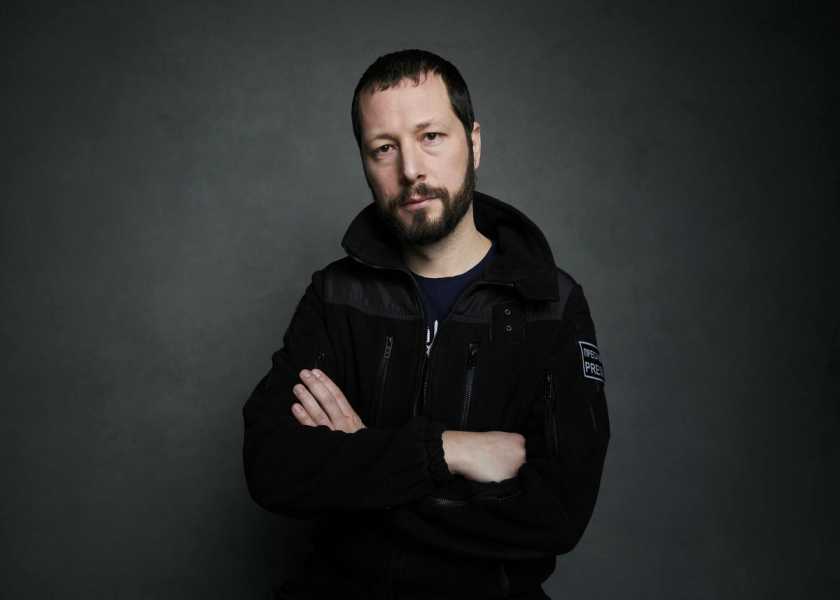
Director Mstyslav Chernov poses for a portrait to promote the film 20 Days in Mariupol at the Latinx House during the Sundance Film Festival on January 22, 2023, in Park City, Utah. Taylor Jewell/Invision/AP
When you were filming, did you have in your head that this would become a documentary?
I was trying to film everything already because since the siege started and no one was there, I just gave myself a word to record everything: “Don’t even turn off the camera.”
But after the maternity hospital bombing, I thought, “Okay, well, it just went to a whole new level of importance.” The symbolism and significance, not just from a journalistic perspective, but also from a historical perspective for Ukraine, and probably for the whole world because like Volodymyr [a policeman in Mariupol, featured in the documentary] kept saying it would change the course of the war. I did not really believe that, but we’re always hopeful.
I felt that moment [the maternity hospital bombing] changed the way I looked at this story. I thought, “Well, if I survive, if I will be able to get everything out, I will definitely want to tell everything together.” And then misinformation started — all these versions were thrown in from Russia. They’re fake, they’re not fake. They’re real, but they were only soldiers or it was Ukrainian bombs. The classic way that Russia deals with big events, they throw in a lot of competing theories, and people just get lost.
So I understood that even to try to explain to people how it really was, you just need to show everything. Thinking about how it will be told and what it will be, that was only when we actually left the city and broke through 15 Russian checkpoints, 100 kilometers of occupied territory.
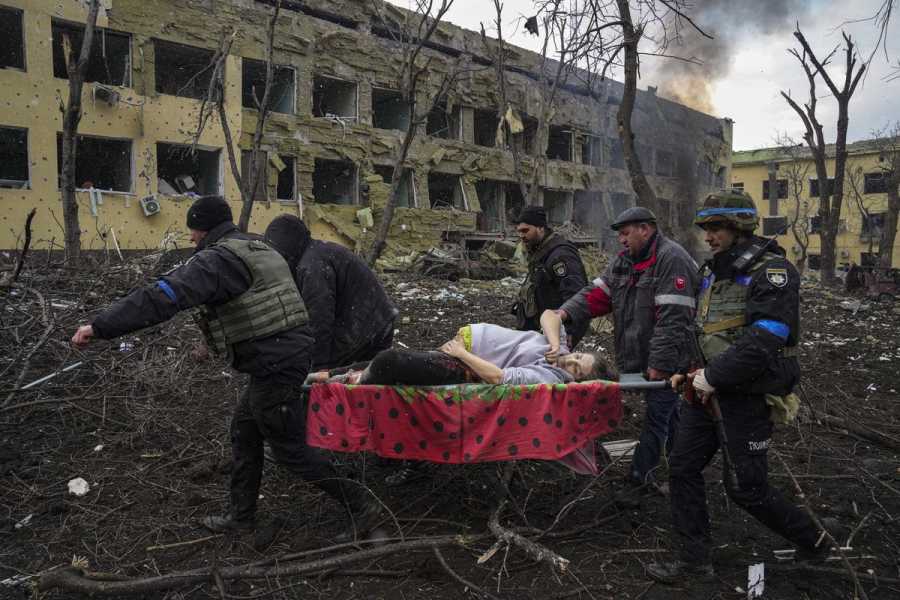
Ukrainian emergency employees and police officers evacuate injured pregnant woman Iryna Kalinina, 32, from a maternity hospital that was damaged by a Russian airstrike in Mariupol, Ukraine, March 9, 2022. The image was part of a series of images by Associated Press photographers that was awarded the 2023 Pulitzer Prize for Breaking News Photography. Evgeniy Maloletka/AP Photo
Volodymyr, the police officer you mentioned, insisted that if people saw this footage, it might change the course of the war. You indicated you thought he was maybe being a bit naive. How do you think about it now?
I’ve given up hopes for big changes made by journalism since 2014.
My conflict journalism career started in 2014, when Russia invaded Ukraine, and then they shot down the [Malaysia Airlines] airplane MH17. It was the first big tragedy — and still is, probably the worst thing I’ve ever seen. Hundreds of people, lying everywhere in fields, burning bones and plastic. Just some of that made it to the news.
But because it was so horrifying, I was so sure this is going to stop everything. Many countries [would] get involved because many, many different citizens were on that plane. I thought they’re going to start a conversation, a ceasefire, an investigation. They see Russia did it. Of course, nothing happened. At that moment, I said, “Okay, if we can even make any change at all, ever, it’s going to be something that happens immediately.”
We shot during the [Mariupol] hospital bombing, and we were able to send it. With those images, NGOs, and the Mariupol mayor’s office in exile, and other politicians, started negotiating a humanitarian corridor, which eventually resulted in the opening of the humanitarian corridor — too late, but it was open. Partially it happened because they had those images. If nine or 10 or 100 lives were saved because of that, that’s all I need.
And then again, when the film was made and it went to Ukrainian cinemas, I’ve seen hundreds of Mariupol residents coming in and seeing it.
Really?
There were several screenings just filled with people from Mariupol. I was really worried. I was thinking, “Oh, we’re going to traumatize these people. They don’t know what they’re walking in for.”
But as hard as it was, when they came out and we started speaking, I realized this was like a start of a collective treatment of this trauma because they’ve experienced, again, what happened to them. But in a safe environment, and together, as a community. They came out and they said, “Well, now we are sure that Mariupol is not going to be forgotten.”
That’s when the second, overarching purpose of this thing came. They feel that all this noise will just make everyone forget about Mariupol. Now they at least have something to hold onto. That memory in the form of film is important for them.
I imagine to be able to see even as horrible an experience as that in Mariupol, reflected back to you, you get to know that it really existed.
I’ll give you an example. There’s this sentence in almost the end of the film, when Volodymyr offers to get us out to the city. He says, “If everyone saw what happened to Mariupol, that will at least give some meaning to this horror.” But that’s not the end of the sentence. The ending of the sentence was “because worse than dying, can only be dying without meaning.”
There is, at least, some meaning. There’s at least a lesson to be learned, somehow, even if we failed to learn some lessons, maybe the next generation.
Because, I keep thinking: Why did this happen? This is a question which we see Marina is asking when her [18-month-old] son Kirill dies. I think that’s the biggest question I felt. Why? I don’t understand why. They don’t understand why.
When I think a lot about this, why, I think partially international society and Russian society — part of Ukrainian society, for that matter — has allowed all these tragedies to happen, has been unprepared for such aggression. Maybe because we didn’t record enough. Maybe we don’t have enough horrifying footage and photos and analysis investigations from the Second World War, the war when the Soviet Union attacked Finland or Afghanistan, so many wars.
We live in a time when all wars are unfolding live, and the whole world is watching it unfolding almost in real time, except Mariupol. That’s an exception. But everything is recorded now. Maybe if we make sure that everything’s recorded, then people who come afterward will not make the mistake we are doing now.
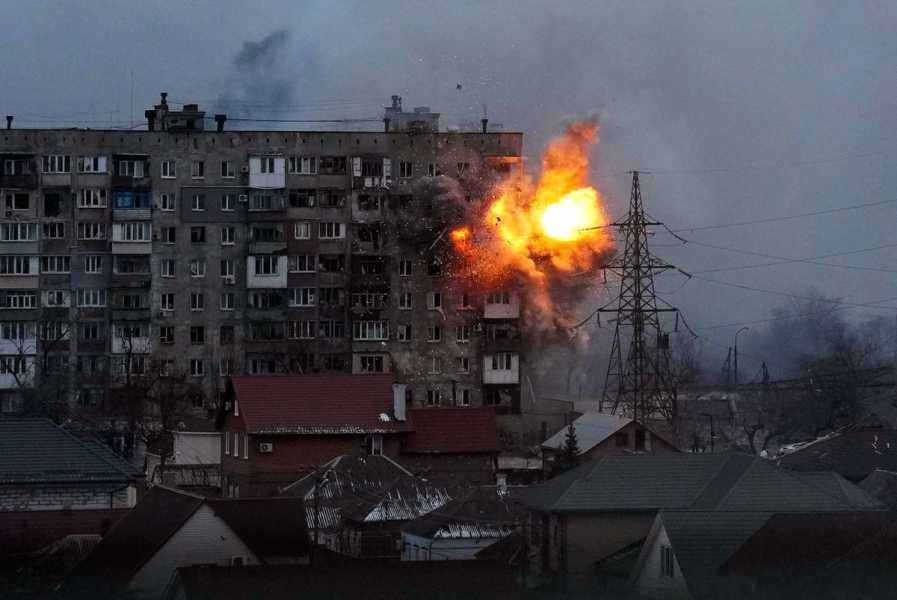
An apartment building explodes after a Russian army tank fires in Mariupol, Ukraine, on March 11, 2022. Evgeniy Maloletka/AP Photo
You shot the film, so you know, but it’s so hard to watch. As I watched it, I thought some version of: We still refuse to learn any lessons from this kind of tragedy. War is brutal and horrible, and yet it happens all the time, and the world creates justifications for it, too.
This is not in the film, but just after Volodymyr says this is going to change the course of the war, the thought that I had right there, when he was telling me this, is, “Why the hell should the lesson be someone dying? Why do we need to even start thinking about changing things because someone died? What kind of thinking is that? That we only start acting when we see a dead child? This is really the wrong kind of motivation.”
Then again, I’m a journalist. I can’t really even imply that I’m on a mission to change the world or I want to change the world. I barely can keep up with the duty to keep informing people. Trying to change the world is just unrealistic, coming back to your previous question.
Then why do it?
I wake up in the first floor of the hospital and there are people on the floor, just lying there, on mattresses because they cannot lie in wards near windows so the patients are on the floor. Some of them lost limbs. Almost no painkillers. They’re moaning and there’s a horrible smell, and someone is calling for a nurse, but the nurse is not there because she’s gathering snow to melt in the buckets to wash the floor. Doctors are running around, and it’s enough doctors just to keep up with the surgeries.
Then you think, “Okay, what should I just sit? That’s it?” No, you can’t. If there’s nothing to film, you grab a bucket of soup and start carrying it around the hospital, giving it to the patients. Carry a gurney or whatever, try to be useful. Having a camera, it’s trying to be useful.
When such tragedy happens — it’s hard to especially here, in New York, in a very comfortable space — to give you an idea how important community feels, having all these people next to you. It’s extraordinary.
That’s the thing. When you say the film is hard. It’s emotionally very hard. It’s not because there was blood. But there’s a sense of loss. But if you look carefully, those people are never alone. There’s always some people still there to support. That’s extraordinary.
You said at the beginning of the conversation that people have forgotten Mariupol. What do you mean by that?
It’s a very natural way that the information field works. The world moves on to other conflicts, to other stories. Also, as a society, as individuals, because we are so well connected, we are bombarded by relevant and irrelevant events all the time. Our memory has a limited capacity, we have limited capacity of attention. We still have to live our lives. Naturally, people just forget.
Making a documentary is helpful to give enough context to make sure that misinterpretation will not take over. And also, there’s so much, so very little comes out of Mariupol right now.
It’s still under Russian control and people cannot leave and pass through the front line, correct?
They can’t. They can do that only if they get Russian passports and they don’t want to get Russian passports. So they’re stuck — like in jail with their Ukrainian identities. All that creates a black hole. You look at the map, you see Mariupol, but you don’t know what’s happening there. It will be eventually filled, so if we don’t make sure that the stories are there, then it will be filled with propaganda and false narratives. That is why every single shot matters.
You see something like your documentary, and you think: How can this war continue? Russia will keep dropping missiles, and people will continue to die. On the other hand, you think of Mariupol, and you think the people there who are entirely cut off, who perhaps don’t want to live under Russian control. When it comes to a question of negotiation or a settlement to the conflict, how do you just say, okay, we’ll maybe carve up Ukrainian territory? I wonder if that comes up at all in your journalism, especially since you’re on the front lines and embedded with Ukrainian people who’ve now been at war for two years.
It does come up a lot. There is a lot of discussion within military and within Ukrainian society. I keep getting these questions all the time when I’m traveling with the film. It’s a very big question. It’s multilayered.
There are several thoughts which I can always try to express. There is a large misconception, which is fueled by Russian propaganda. One of the main narratives is: Stop sending weapons to Ukraine and the war will stop. It’s a simple thought, kind of logical, but it’s actually not, because in the position of however many or few weapons Ukrainians have, they cannot stop fighting because they are fighting for their survival. If they just stop fighting, Russia will just go forward. And again, Bucha, Mariupol, Kherson, Izium, mass graves, war crimes, torture, kidnapping children — all this is going to repeat itself again. If the world stops giving weapons, Ukrainians will keep fighting.
I can understand that the world has limited resources and limited attention. So the second thought comes in. A large portion of Western society — Western European, US politicians —don’t really understand that Russia, right now, lives in a state of war with the West. Just think about this for a moment: The core idea for the majority of the Russian population, and for the whole Russian establishment, is the idea that they live in a state of war with the whole West. And the West doesn’t know about it. It’s like your neighbor is at war with you, and you don’t know about it. That is a really weak position, and it’s a really vulnerable position, because it inevitably will lead to worse endings situation.
And the third thought — for example, I overheard a conversation, a German politician speaking to a Ukrainian. “Well, just give up the land and we’ll stop the tragedy.” What would your country do if a fifth of your country was invaded by Russia, and your children are kidnapped, thousands of people die, would you just forget about it? No one would. If Russia invaded the US, would it be even possible to consider? “Okay, let’s give them Las Vegas and there will be peace.” It’s just impossible to imagine. It is also an absurd thought to Ukrainian society.
I’m just giving you opinions that I’m hearing on the ground. This is not my journalistic opinion. These are thoughts that emerged over time when I was speaking to military and to civilians.
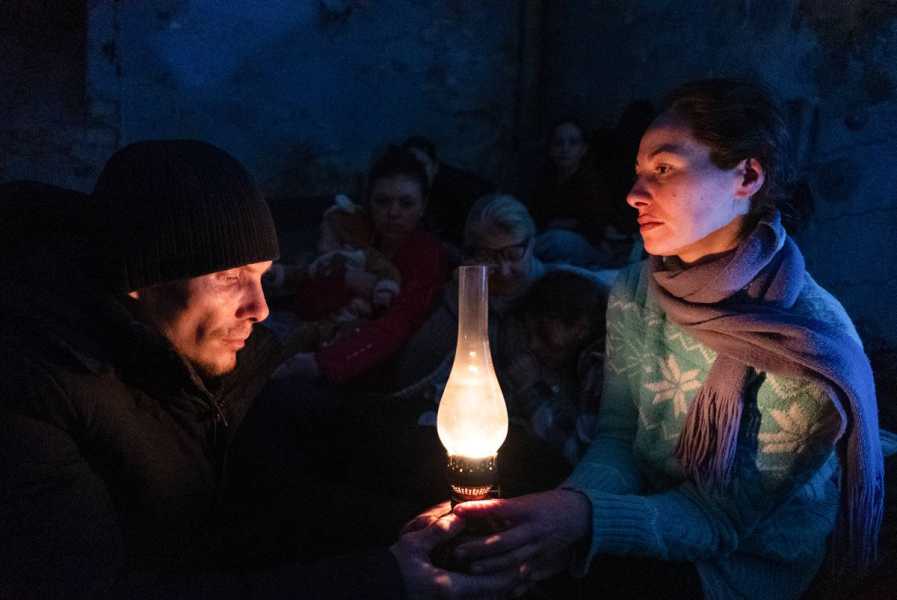
People take shelter in a youth theater in Mariupol, Ukraine, March 6, 2022. Still from Frontline PBS and AP’s feature film 20 Days in Mariupol. Mstyslav Chernov/AP Photo
Two years into this war, what do you see for the future?
I have a hopeful answer for you, at least about Mariupol. After Mariupol, Bucha, and Kharkiv, I briefly went to Rome for [a] media conference. I love Italy, I love Rome. I just kept looking at this vibrant, beautiful city with happy people, with tourists and parties and good times. I kept looking at it, and I couldn’t enjoy it at all. This feeling of disconnection and I thought, at some point, “Why are these people even enjoying their lives when a couple thousand kilometers from them someone is dying to try to protect their values?”
But anyway, that’s not the point. The point is that I had a friend next to me, we’re driving and I said, “Look, I just can’t look at these parties, these happy people. I’m sorry. It’s very hard for me because I keep thinking about the burned-down Mariupol, skeletons, the buildings and people buried in the craters of shells, mass graves.” And he said: “Do you know how many times Rome was burned to the ground? And look at it now.” He said the same thing is going to happen to Mariupol, sooner or later.
Nothing’s permanent, either. I guess that’s the scary part.
Humans are amazing at coming back to life. Rebuilding. This would amaze me always, wherever I go, whether it was Iraq or Aleppo in Syria, also destroyed by bombs, commissioned to be reconstructed by the same people who destroyed it. The same thing is happening to Mariupol, too. But everywhere, Nagorno-Karabakh and Gaza, everywhere. You think people can’t recover from that. And here they are, just emerging from ashes.
Sourse: vox.com